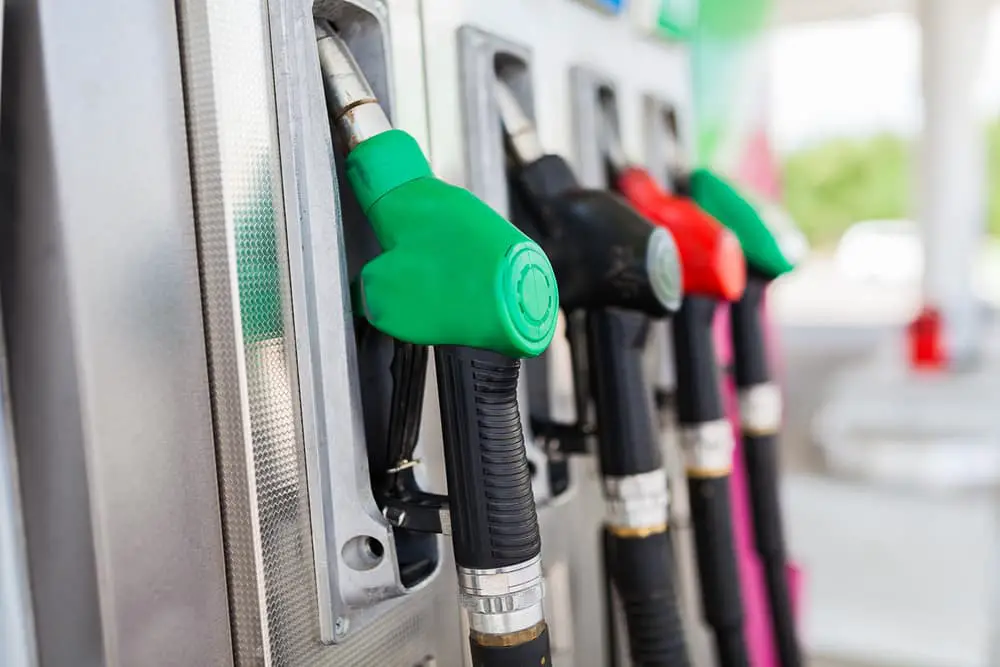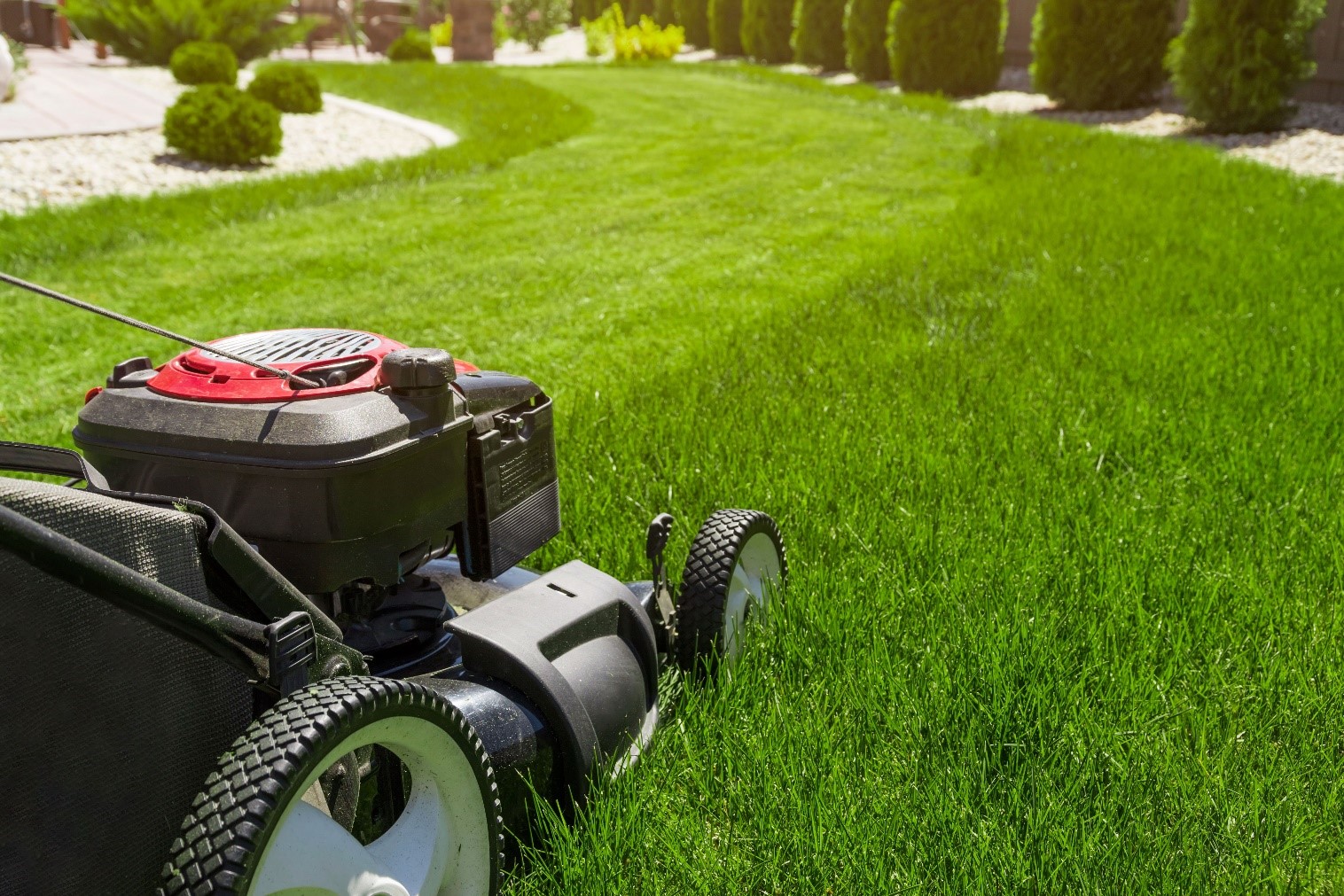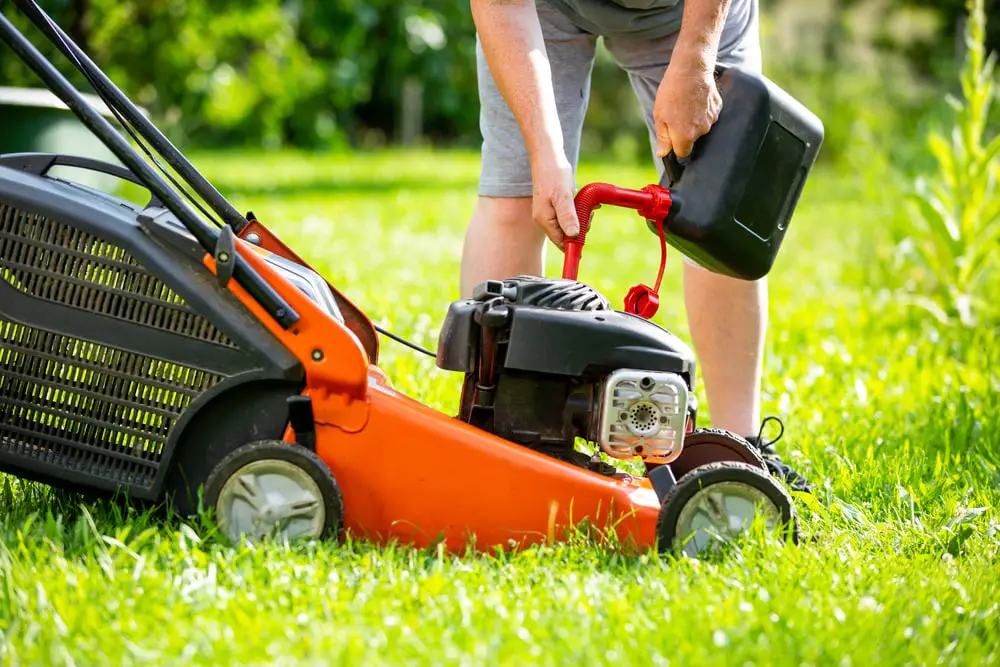To start the engine of your gas lawn mower, whether you have just bought a brand-new one, or maybe you are wheeling out your old reliable model, you will need fuel.
Despite what you might think, small engines can be picky about the type of fuel they utilize.
It’s difficult to choose a certain pump at the gas station when there are lots of options. Finding precise information about the fuel you’re purchasing can be challenging due to the variety of fuel kinds, labeling, and costs.
Here we discuss the various fuels and determine which gas is ideal for lawn mowers. Also, we talk about the most frequently asked lawn mower questions from their users.
What Type of Fuel Should I Use in My Lawnmower? (Short Answer)
Generally, unleaded gasoline with an octane value of at least 87 and an ethanol percentage of 10% or less is required for lawn mower engines.

Both 2 and 4-stroke engines have this characteristic.
However, in contrast to 2 stroke engines, which run on a blend of unleaded gasoline and two-cycle engine oil, 4-stroke engines simply burn gasoline.
How Can I Purchase Fuel for My Lawn Mower?
You just must use a one-gallon red gas can and go to the nearby gas station or other establishments that sell gasoline, such as BJ’s.
In What Location Should I Keep Petrol for Lawn Mowers?
You should never keep gasoline inside your home. Leave the can in the mower’s storage to better protect your children. Purchase a lockable fire-resistant cabinet and install it outside the garage or shed.
How Long Does Petrol for A Lawn Mower Last?
After just 90 days, gas sold at petrol stations begins to degrade. It will benefit your engine to add a gas stabilizer, which can extend its useful life by up to a year.
Can You Use Car Gas for The Lawnmower?
Yes, most lawnmowers have four-stroke engines and need regular unleaded fuel. For particular fuel needs, always consult your owner’s manual
Instead Of Gas from the Station, Are There Any Good Alternate Fuels for Lawn Mowers?
The ethanol-free gasoline known as TruFuel is an excellent alternative fuel option, which is available at large box shops.
It’s the greatest type of fuel with no Ethanol. But it has a heavy price tag that can be up to ten times higher than regular gas. Use a fuel stabilizer to keep your lawnmower safe
Over 30 days, lawnmower gas will begin to deteriorate. Fuel that contains ethanol is less durable than fuel that doesn’t.
Antioxidants include fuel stabilizers like Seafoam and Stabil. They take up water vapor from the gas and halt chemical decay, which can cause the varnish to accumulate in your lines and tank.
Before putting your lawn mower away for the winter, add the recommended amount of stabilizer to the gas tank and let the engine run for a few minutes. Less engine sputtering and stalling will occur when you pull the cord in the spring.
If there’s no fuel stabilizer, use new unleaded gasoline for optimum performance.
Do Lawn Mowers Use Regular Gasoline or Do They Utilize Something Else?
There are several options available if you want to know what fuel lawn mowers utilize. Yes, Mowers often take regular gas. But not all ordinary gas has the same octane level.
Regular gas usually has an octane rating of 87, which is suitable for all lawn mowers.
Anyhow, I’ll go into further detail below on the properties of each fuel type that can be used in a lawn mower engine.
Regular Unleaded Gasoline
Regular unleaded gas is the fuel that is utilized the most. Once more, it typically has an 87-octane rating and is offered at all petrol stations.
This is typically the least expensive and lowest octane gasoline you can buy. Additionally, you should use this gasoline—which has the lowest octane rating—in a lawn mower or any other compact engine l.
A measure of gasoline’s ability to withstand compression before igniting is called octane.
Fuels with a higher-octane rating can handle more compression than fuels with a lower octane rating.
Due to gasoline engines requiring constant air and fuel compression to function, this measurement is crucial.
Mid-Range Unleaded Gasoline
Typically, mid-range or “plus” fuels are sold as gasoline with octane ratings between 88 and 90. This type of gas can tolerate a little bit more compression and is a little bit more expensive with a little higher octane.
You’re better off choosing a mid-range or premium gasoline option if the ordinary gas at your local gas station has an octane rating under 87.
Premium Unleaded Gasoline
The standard rating for high octane or premium grade unleaded gasoline is 91. It’s a little less frequent for gas businesses to provide fuel with an octane rating of 92 or 93 as their most expensive option.
Because of its high-octane level, premium unleaded gasoline is recommended by some automakers, although other people vehemently disagree as to whether it is worthwhile to spend more money on it for lawn mowers.
We don’t think purchasing premium petrol for lawn mowers is always required. However, if you’d prefer, you can use high-octane unleaded fuel in tiny engines.
Non-Oxygenated Gasoline
Before we talk about Non-Oxygenated Gasoline, let’s discuss first the oxygenated gas.
Fuel is often oxygenated. This indicates that oxygenates, a kind of fuel additive, is added to fuel to improve fuel combustion and octane ratings.
Ethanol is the most widely used oxygenate-containing gasoline additive. As a result, ethanol is present in almost all oxygenated gasoline.
In contrast, non-oxygenated gasoline is unleaded fuel that doesn’t include any ethanol. However, why would individuals desire to utilize fuel devoid of oxygenates or ethanol?
Adding more oxygen to gasoline can result in moisture contamination.
To cut a long story short, non-oxygenated gasoline is what some people prefer to use in engines that aren’t used regularly to reduce the likelihood of moisture causing problems with the fuel system.
This sort of gasoline is typically harder to come by and tends to be more expensive.
The Gas We Suggest You Use
Still, looking for the best fuel to use in your lawn mower?
We recommend using either regular unleaded or un-oxygenated gasoline. You might be wondering why we advise using either of these two fuels when they are rather different from one another.
Below, we explain when each one is best used.
Regular Unleaded Gasoline
About push mowers – always choose normal unleaded fuel. Despite having a lower octane, it performs equally well as mid-range and premium fuels.
Saving a few dollars here and there is great, and we just don’t believe lawn mower engines need the higher compression rating of more expensive fuels.
Non-Oxygenated Gasoline
The first step is being able to locate non-oxygenated gasoline. Even though it can be hard to get in some places, non-oxygenated gasoline is a fantastic fuel choice for all kinds of mowers.
Because it doesn’t have any ethanol, non-oxygenated gas can help the engine in your lawn mower last longer.
What Fuels Should You Avoid Using in Your Lawn Mower and Why Should You Avoid Them?
Although many different fuels can be used in lawn mowers, some do not work well with lawn mower engines. The following two fuels ought to be avoided.
High Ethanol Content Gasoline Blends
Nearly all gasoline in the United States (and most other nations) includes up to 10% ethanol, however, many people are unaware of this.
Regular, mid-range, and premium unleaded gasoline all fall under this category.
Any fuel that contains more than 10% ethanol is labeled differently, such as E15 for 15% ethanol or E85 for 85% ethanol.
Even though these fuels have their applications, it is not a good idea to use these fuels in your lawn mower. Since fuels with a high ethanol percentage can cause corrosion, small engines and high ethanol fuels don’t get along.
Diesel
This might go without saying, but diesel fuel should never be used in a gasoline engine (the same is true for diesel engines and gasoline).
If you put diesel in your lawnmower, you’re going to get into a lot of trouble, and you might not be forgiven by your small engine mechanic.
When you’re at the gas station, make sure to double verify the fuel you’re pumping.
What Sets Ethanol-Blended Fuels Apart from Ethanol-Free Fuels?
The corner gas station sells ethanol-blended fuels that have an ethanol content of up to 15%.
A chemical made from a grain called ethanol is added to gasoline as a more environmentally friendly substitute for petroleum-based products.
Ethanol does, however, react over time with the metal and plastic used in your lawnmower engine.
Only at your local hardware store or small engine service center can you find these products. It is not offered at the gas pumps.
Which One Should You Buy Premium or Regular Gas?
Most lawn mowers and four-stroke engines don’t require premium gas or fuel with a high-octane rating, such as premium 93 octane fuel.
Mostly of mowers can function properly with standard 87-90 octane fuel.

But you should always verify your manufacturer’s manual for the precise engine specifications for your model since it can need higher octane ratings.
It won’t run more smoothly or have more power if you use higher octane fuel in your standard lawnmower. It can add up quickly, especially if you use a lawn mower with a ride-on tractor-like increase in gasoline consumption and power.
How This Affects Your Fuel Selection When Choosing a Mower: 2 or 4 Strokes
When it comes to 2 and 4-stroke engine fuel, there is only one significant difference.
Two-stroke engines burn a mixture of gasoline and oil.
On the other hand, 4-stroke engines maintain their engine oil in a separate reservoir and solely burn gas.
When you fill the gas tank on a two-stroke lawn mower, you must add a certain amount of premium two-stroke engine oil.
It’s essential to use the precise gas-to-oil ratio in a 2-stroke engine. Both 2-stroke and 4-stroke mowers need the same kind of gas aside from this distinction.
Does High Octane Gasoline Enhance Performance?
The greater octane in premium gas won’t improve the performance of your mower and it is not dangerous.
Winter is the best time to use it but make sure your engine is clean before you switch to another type of fuel.
Regular petrol guarantees performance, is more affordable, and is recommended for summer driving.
You could select either petrol – but think about their prices.
The amount of ethanol present in the gasoline should be your top priority. Lawn mowers only require a maximum of 10% ethanol in their gas.
Anything more than the recommended 10 percent ethanol content for lawn mowers will damage your engine.
It is preferable to use canned gas like Briggs & Stratton’s advanced formula ethanol-free fuel owing you can examine its ingredients and determine its ethanol content. Additionally, it is correctly combined and able to be used.
Maintenance of Your Lawn Mower’s Fuel System
Your lawn mower will maintain a clean fuel system throughout the summer if you use it every week.
However, the gasoline will deteriorate as it sits over the winter, and this can lead to fuel line damage and combustion chamber clogging.
Before putting your lawn mower away for the winter, run the engine completely dry to prevent damage.
Final Thoughts on What Fuel Should I Use in My Lawn Mower?
In parting let’s add one little tip:
By adding a fuel stabilizer, you can protect the mower if there is too much gas left over at the end of the season to use up in an hour. This will delay fuel deterioration.
For the final fill-up of the season, go for an ethanol-free gas for the greatest results. A fuel stabilizer is then added.
Keep on looking after your gardening equipment and it will look after you and your garden for long into the future.
Spread the love.
Read More:
12 Tips to Get Rid of Grub Worms on your Lawn 
Putting Salt on Grass (What you Need to Know!)
How Many Square Feet are on a Pallet of Sod? +Sod Calculator

